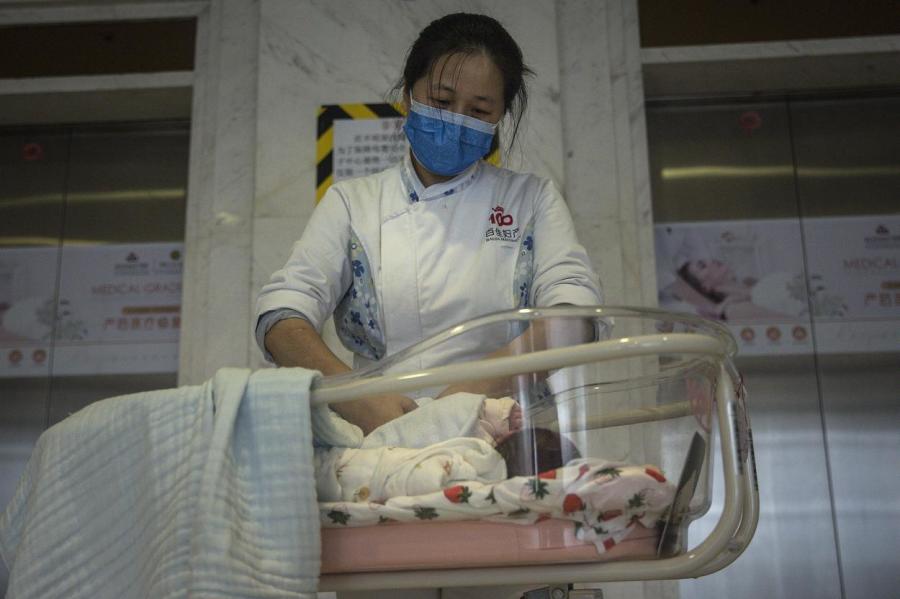Image: On March 12, 2020, at a private maternity hospital in Wuhan, Hubei Province, China, an obstetrics nurse wearing a mask cares for a newborn. (Photo by Getty Images)
[People News] Five years of the pandemic have drastically reduced China's population. Three years ago, the Chinese Communist Party (CCP) claimed there were 850,000 fewer people, but citizens suspect the real number could be hundreds of times larger. The CCP’s increasing demands for more births—from promoting early marriage and childbirth to even urging women nearing 50 to have children—suggest that the population may have fallen to pre-One-Child Policy levels of around 800 million. Recently, a bizarre new method to force marriages has emerged, leading netizens to mock it as a "rebellious battle tactic."
Deng Yuwen, a former official from the CCP Party School, recently posted an article online revealing that the CCP is pressuring male and female cadres within the system to find ways to date and marry within their workplaces. The directive emphasizes strengthening "marriage pairing campaigns" to prevent the organization from being "hollowed out by non-marriage and hedonism." It encourages unmarried cadres to share tables at work cafeterias and proposes freezing special bonuses for those who maliciously avoid marriage until they are successfully paired. It also suggests adjusting night-shift schedules to pair unmarried men and women as much as possible. To foster mutual affection, offices should be arranged to ensure close working spaces for men and women, aiming to cultivate feelings of mutual respect and love over time.
Netizens found this hilarious, joking, "They're expanding the Party's 'members-first' marriage tactics to all civil servants now! Are they expecting people to turn their workplaces into bridal chambers? Why is there so much 'malice' in China—from malicious wage delays to malicious rights protection, and now the term 'malicious non-marriage'? Using bonuses to punish people? This isn't breeding—it’s ridiculous. Just pairing up any man and woman? They’re overreaching too much."
A recent online leak revealed that Shandong Shuntian Chemical Group issued a notice requiring single employees (ages 28 to 58, including those who are divorced) to marry by a set deadline or face dismissal. The notice claimed this policy was to "respond to national calls" and warned that failure to comply would be considered "disloyalty." Employees were required to "resolve their marital status by September 30, 2025." The policy stated that failure to marry in the first quarter would result in a self-critique, the second quarter would lead to evaluations, and the third quarter would result in dismissal, terminating their labor contracts. The company's office and HR departments were also tasked with supervising compliance.
If this continues, being unmarried or childless may soon be punished as harshly as violating the one-child policy once was, potentially leading to confiscated property, fines, and even imprisonment.
Data released by the Ministry of Civil Affairs on February 8 revealed that the number of marriage registrations in 2024 dropped to 6.106 million pairs, down 1.574 million from 2023’s 7.68 million pairs—a 20.5% decrease and the lowest in 45 years. Birth rates have declined even more, as many young people in China are now unwilling to have children.
Some netizens noted that in today's disaster-prone society, people believe that those who die suddenly in broad daylight have no chance of reincarnation. Religious figures suggest that true practitioners transcend the cycle of reincarnation altogether. In this context, low birth rates may reflect a celestial phenomenon, and the reluctance of young people to marry and have children is natural and private. Attempting to solve this issue through forced intervention is seen as absurd.
Historically, the CCP has tried numerous campaigns to defy nature and human nature—whether during the Great Leap Forward, the Cultural Revolution, the One-Child Policy, or through attempts to reshape nature and ideology. None of these campaigns succeeded, and all led to disasters.
The destruction of traditional family structures and moral values threatens to destabilize society’s basic social units. If childbirth out of wedlock is encouraged by policy, issues related to divorce, single-parent families, and child-rearing will multiply. Laws against bigamy will be rendered meaningless, legitimizing extramarital children of powerful officials and wealthy individuals. The risk of social unrest will increase dramatically.
Local policies in China have also allowed unmarried women to seek in vitro fertilization (IVF) at hospitals. This means that children and their mothers may never know who the father is. Beyond the high costs of raising a child, the absence of a father figure could hinder children’s personality and character development, making social relationships challenging later in life. If many single women resort to IVF, they may find themselves tied to child-rearing as "child slaves," trapping them in societal constraints. What kind of future society would that create?
Even more alarming is the risk of genetic-related issues. If sperm donors remain anonymous and multiple women receive sperm from the same donor, the resulting children would be half-siblings. If they unknowingly marry, it would violate ethical principles and increase the risk of birth defects, creating a serious societal problem.
All of this could ultimately drag down the population's overall quality, solely because decisions made by government officials turn their whims into law. Such outcomes reflect the harmful nature of the CCP’s authoritarian regime.
Political commentator Fang Yuan told the media, “This treats people as tools for managing the nation, with a ‘human resource’ mindset. Lowering the marriage age for women is not only harmful to women’s rights but also ignores the broader social consequences. Their only goal is increasing the population, which is inherently evil and bound to harm the nation.”
Others worry that the CCP may resort to technological solutions to address the population decline, such as cloning or using intelligent robots as substitutes. Such actions would eliminate human ethics and represent another form of human destruction.
Observers believe that the root cause of China's social crises lies with the CCP. The CCP has long used various methods to disrupt human thought, undermine traditional culture, and destroy moral order. This has eroded traditional family values and marriage concepts, leading to rising family conflicts and divorce rates, as well as a general indifference toward life.
The family is the fundamental unit of Chinese social structure and the final line of defense in a person’s life—a safe haven for comfort and stability. Interfering with and destroying family structures jeopardizes the future of the entire nation.








News magazine bootstrap themes!
I like this themes, fast loading and look profesional
Thank you Carlos!
You're welcome!
Please support me with give positive rating!
Yes Sure!